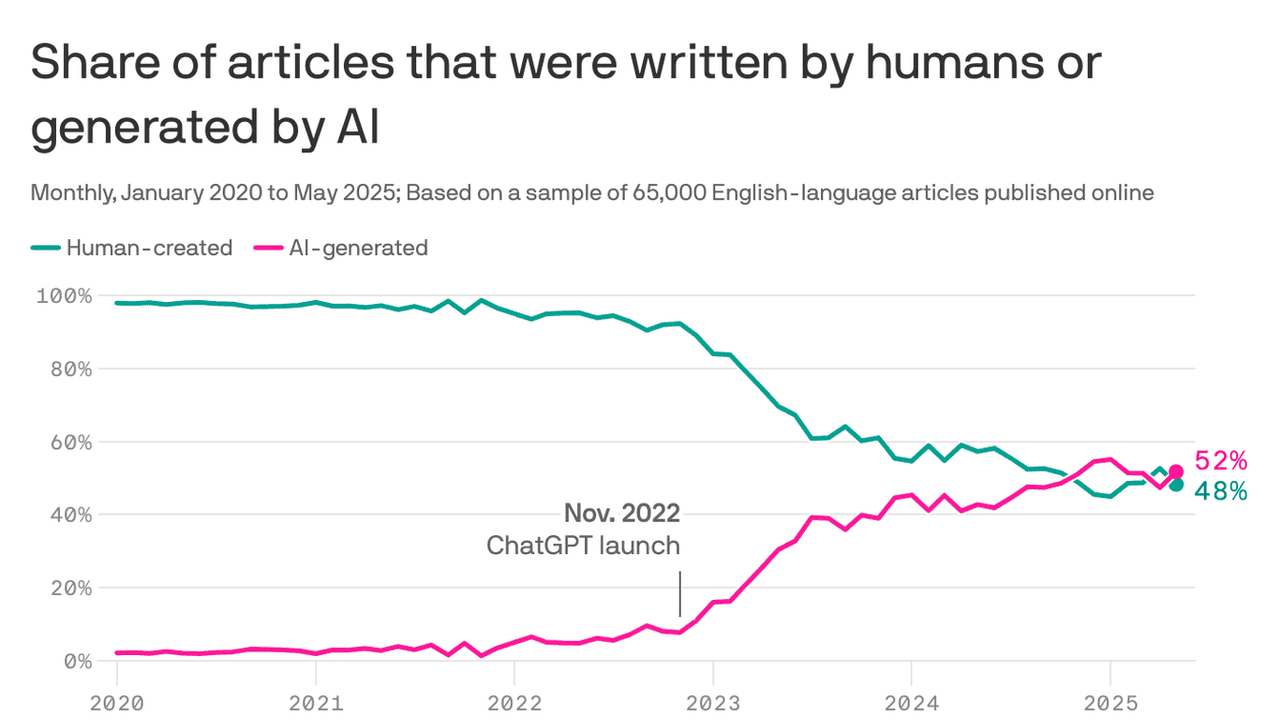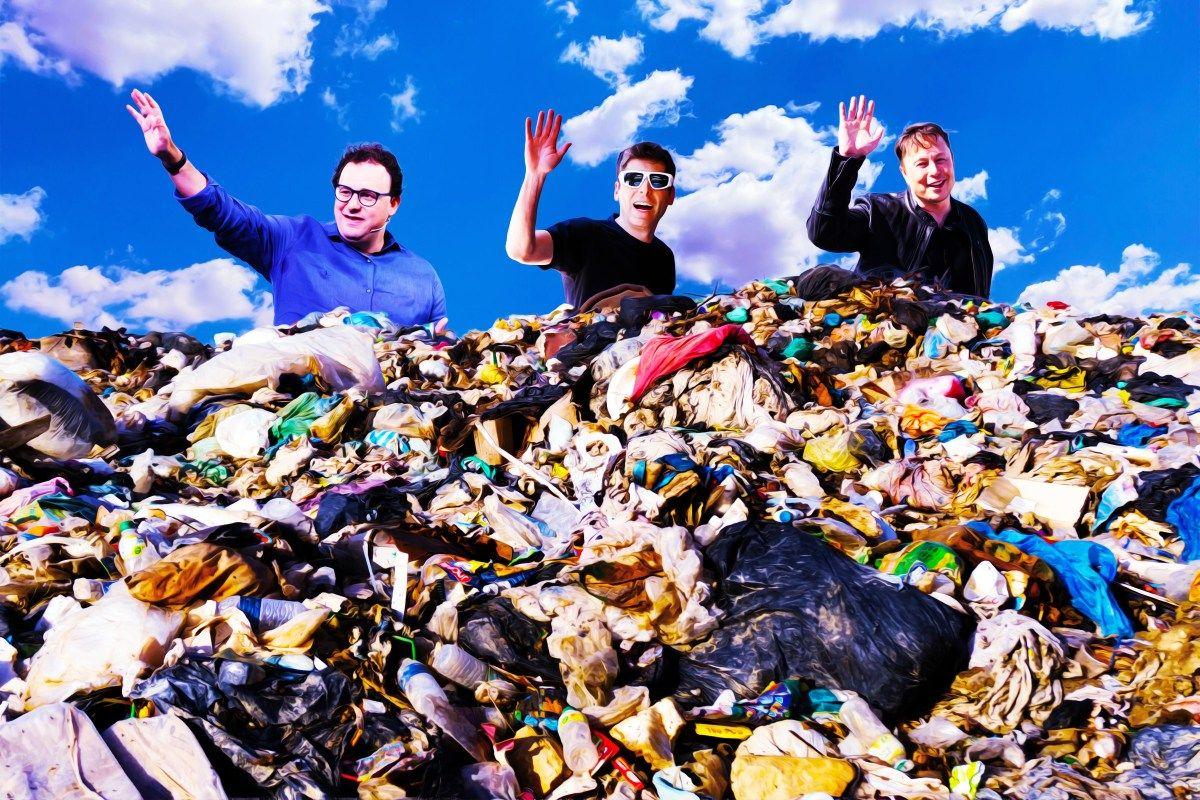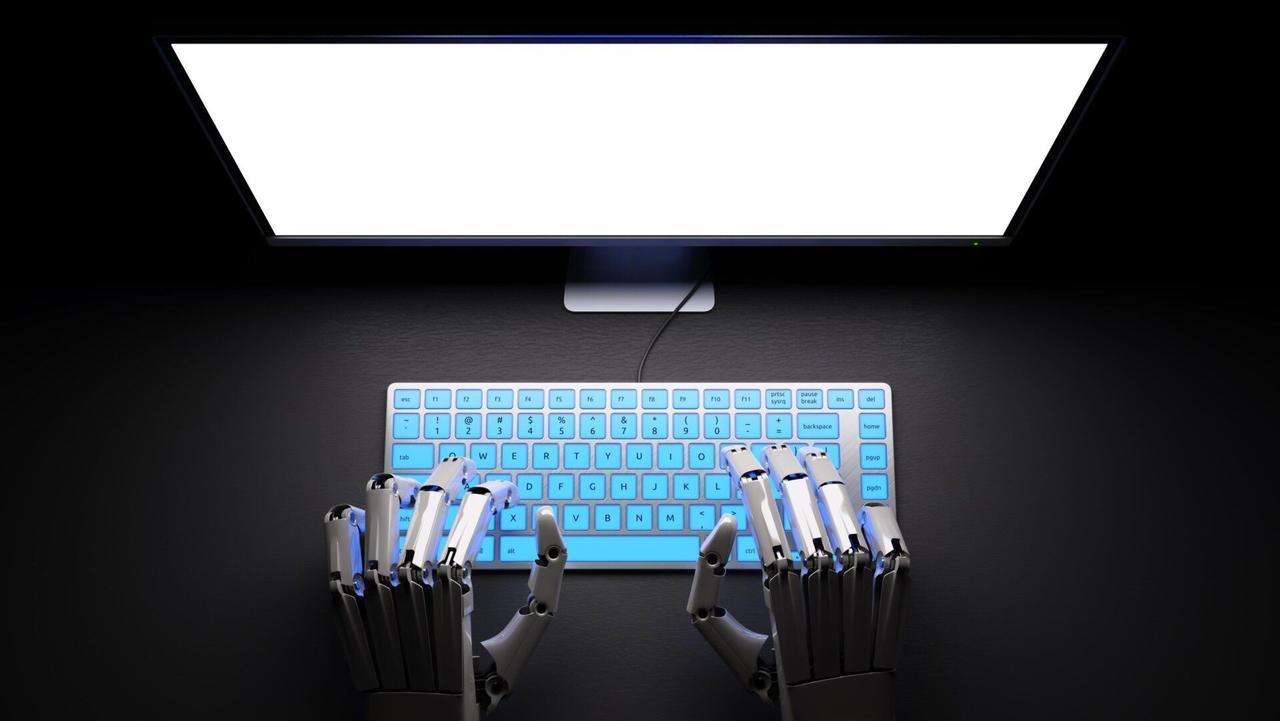AI-Generated Content Surpasses Human-Written Articles Online, But Growth Plateaus
6 Sources
6 Sources
[1]
More than half of new content is AI-generated now, report finds
You aren't imagining it: There is more AI slop on the internet. In fact, half of the articles you're coming across are AI-generated according to SEO firm Graphite, which found that over half of the written content on the internet is produced by AI. Also: Is art dead? What Sora 2 means for your rights, creativity, and legal risk Human writers seemed to be losing the battle against AI, with AI-generated articles slightly overtaking human-written articles between November 2024 and March 2025, according to raw data. In January 2025, that data found AI-generated articles peaked at 55%. However, the proportion of AI-generated articles has remained "relatively stable," according to Graphite. The researchers don't see the disproportionate flood of AI-generated articles continuing. "We hypothesize that this is because practitioners found that AI-generated articles do not perform well in search, as shown in a separate study," Graphite said in its post. Perhaps the AI Google and other search engines are using is trained to spot and avoid AI-generated articles. How ironic. Also: Beware of getting your product buying advice from AI for one big reason, says Ziff Davis CEO The share of articles on the internet written by AI has rapidly grown since the release of OpenAI's ChatGPT in 2022. A year after its release, AI-generated articles accounted for 39% of published articles on the internet, according to Graphite. Despite their ubiquity, Graphite writes that these AI-generated articles aren't appearing in Google and ChatGPT. However, AI's rapid improvement may make it more difficult to detect whether content is AI-generated, even as AI content detectors improve at a similar rate. Want more stories about AI? Sign up for AI Leaderboard, our weekly newsletter. Earlier this month, Pew Research Center found that only 2% of Americans regularly get news from AI, while most Americans, 75%, say they never get news from AI. Those who are getting their news from AI reported not fully trusting the information they see. Also: I found 5 AI content detectors that can correctly identify AI text 100% of the time As AI tools and use cases bleed into every industry and aspect of daily life, avoiding them becomes harder. The report only emphasizes the long-running question -- and, at times, problem -- of AI's viability as an information tool.
[2]
Slop Central: More Than 50% of Articles Online Are Now AI-Generated
Emily is an experienced reporter who covers cutting-edge tech, from AI and EVs to brain implants. She stays grounded by hiking and playing guitar. The number of AI-generated articles on the web has skyrocketed since the launch of ChatGPT, surpassing the amount of human-generated work. The number of AI articles on the web is slightly above 50%, according to a new report from SEO firm Graphite, which analyzed 65,000 URLs published between January 2020 and May 2025. Still, the rate of AI-generated content since ChatGPT's debut in November 2022 is astonishing. Some minor good news is that the renaissance of robot ink seems to have plateaued since May 2024. Since then, some months have seen more human work, but the two are neck-and-neck. Graphite does not explain the slowdown, especially since the number of ChatGPT users continues to grow; OpenAI now puts its weekly active user count at 800 million. The idea that half of what we read on the web could be written by a robot is alarming, but how many humans are actually reading chatbot-produced content? Bad actors have turned to AI to crank out propaganda articles, as we saw last year with Iran. They are trying to flood the web with this content, so tools like ChatGPT and Google's AI Overviews regurgitate it to users. In a separate study, Graphite said AI-generated articles largely do not appear in Google and ChatGPT. "We do not evaluate whether AI-generated articles are viewed in proportion by real users, but we suspect that they are not," it says. Another caveat: Detecting AI content is notoriously difficult, so there could be false positives. Graphite pulled the URLs from Common Crawl, a large, publicly available web archive, and ran chunks of their text through a free AI detection tool called Surfer. It classified the articles as AI-generated if Surfer predicted more than 50% of the content came from an AI. The team tested Surfer's chops by generating 6,009 phony articles using ChatGPT's GPT-4o model, and seeing if it could detect them. Surfer correctly classified 99.4% of them as AI. Still, there's no denying the internet is trending toward more and more AI-generated content every day, especially with the launch of new tools like OpenAI's Sora 2 in early October.
[3]
Exclusive: The web is still mostly written by humans, study finds
The big picture: A 2022 report from Europol estimated that 90% of online content would be generated by AI by 2026. * According to Graphite's analysis of 65,000 URLs that were posted online between 2020 and 2025, the percentage of AI-generated articles rose sharply after ChatGPT's launch in 2023. * The percentage of AI-generated articles in this data set briefly surpassed human-written articles in November 2024, but the two have stayed roughly equal since. What they did: Graphite used an AI detector called Surfer to analyze a random sample of URLs from Common Crawl, an open source database of over 300 billion web pages. The database spans 18 years and adds 3-5 billion new pages monthly. * The pages had publish dates between January 2020 and May 2025 and were classified as either articles or listicles using Graphite's article page type classifier. * Articles were deemed AI-generated if 50% or less of the content was found by Surfer to have been written by a human. Zoom in: Distinguishing between machine and human-written content is tricky. * To evaluate Surfer's accuracy, Graphite tested it with its own sample of AI-generated articles and with a set published before ChatGPT's launch, which were likely written by humans. * Surfer had a 4.2% false positive rate (labeling human-written articles as AI-generated) and a 0.6% false negative rate (labeling AI-written articles as human) for articles it generated with GPT-4o. By the numbers: Content farms may also be learning that AI-generated content isn't prioritized by search engines and chatbot responses, according to a second report from Graphite. * Graphite found that 86% of articles ranking in Google Search were written by humans, and 14% were generated by AI. * The pattern held across chatbots too. 82% of articles cited by ChatGPT and Perplexity were written by humans, and only 18% were AI-generated, according to Graphite's research. * When AI-generated articles do appear in Google Search, they tend to rank lower than human-written articles. Yes, but: Researchers told Axios that a definitive count of AI-made content isn't possible with today's tools and definitions. * It's hard to determine what content is AI-generated and what is human-generated because humans are increasingly working together with AI. * There are so many different degrees by which someone might utilize AI in their work that it's challenging to definitively say something is AI-generated or not, a Google spokesperson told Axios. * "At this point, it's a symbiosis more than a dichotomy," Stefano Soatto, professor of computer science at UCLA and VP at Amazon Web Services, told Axios. * Not all content created with AI is considered spam, the Google spokesperson said. The intrigue: Common Crawl isn't the entire web, but it is one of the largest sources of training data for large language models. * As a result, some paywalled websites -- where content is presumably human-written -- are blocking Common Crawl from indexing their pages. * This could mean that the volume of human-written articles is even larger than what Graphite's data shows. What we're watching: Clearly labeled AI summaries of closed, proprietary content do well in search, Graphite CEO Ethan Smith told Axios. * But it's a different story for AI summaries that are auto-generated by search engines. * A Pew survey from last week found that enthusiasm for most AI summaries in search is modest: just 20% of users say those AI summaries are extremely or very useful, and only 6% say they trust them a lot. The bottom line: For now, humans still want to read content that is written mostly by humans.
[4]
Over 50 Percent of the Internet Is Now AI Slop, New Data Finds
Rejoice, netizens of flesh and blood, for only a little over half of all new articles on the internet are AI-generated, according to a new report highlighted in Axios. Since the public launch of ChatGPT in November 2022, we've been battening down the hatches amid an absolute deluge of AI slop. But it hasn't quite drowned us all yet, evidently. The report, published by the SEO firm Graphite, analyzed a random sample of 65,000 English-language articles published between January 2020 and May 2025. Using an AI detector called Surfer, any article that was found to have 50 percent or more of the content written with a large language model was considered AI-generated. As expected, the analysis showed a rapid spike in AI-generated articles coinciding with the release of ChatGPT, from roughly ten percent in late 2022, to over 40 percent by 2024, before slowing to a more steady climb. Now, for the good news: it looks like the influx of AI articles has hit a plateau. After AI-generated articles hit a peak in November 2024, the share of newly-published AI and human-written content has been hovering around a fifty-fifty split, As of this May, the share of new AI articles is at 52 percent, trading places from just a month ago when human written articles enjoyed a brief majority. There's also a possibility that the proportion of human content may be even higher. The researchers used an open source dataset of hundreds of billions of webpages called Common Crawl. Because AI firms plundered this treasure trove of data to train their LLMs, many paywalled websites have started blocking Common Crawl from indexing their pages, Axios notes. These almost certainly human written articles, then, would be left out of Graphite's analysis. We should also take the judgments of AI detectors with a grain of salt, since their reliability is up for question. In its own testing of Surfer's accuracy, Graphite had the detector analyze a sample of AI-generated articles and another sample of human articles, finding that it labeled human-written articles as AI-made 4.2 percent of the time -- a common problem with these tools -- but only mistook AI-written articles as human 0.6 percent of the time. In any case, why AI articles seem to be plateauing is unclear. Citing a second report from Graphite, the Axios coverage notes that it may be because AI content farms are realizing that their shoddy slop isn't being picked up as much by search engines and chatbot responses, with the firm finding 86 percent of articles in Google Search were written by humans, and only 14 percent AI. Still, this could belie another trend. More writers could be using AI chatbots and other tools in their creative process, foiling AI detectors and blurring the line between what's machine-made and human. "At this point, it's a symbiosis more than a dichotomy," Stefano Soatto, professor of computer science at UCLA and vice president at Amazon Web Services, told Axios.
[5]
AI content now outnumbers human-written articles on the internet, but the good news is that the slop seems to have plateaued, for now
In a development that will surprise nobody who senses the rising tide of AI slop, new research indicates that AI content has now overtaken human-written work on the internet. But there's a good-news twist: The slop seems to have plateaued. Research outfit Five Percent has published a new white paper analysing online content published between January 2020 and May 2025. The results indicate that material created with machine learning tools initially overtook human-written content late last year. However, the data also shows the proportion of AI-generated material plateauing. In fact, the rapid growth of such content actually begins to slow in the data around mid-2023. Two immediate questions spring from this. First, why is AI content plateauing? Second, how accurate is this study likely to be? Five Percent addresses both of these queries. "While AI-generated articles grew dramatically after ChatGPT launched, we do not see that trend continuing. Instead, the proportion of AI-generated articles has remained relatively stable over the last 12 months. We hypothesize that this is because practitioners found that AI-generated articles do not perform well in search, as shown in a separate study," the study says. So, that's a candidate explanation for the plateauing. Google is doing a half-decent job of weeding out AI slop, if you can believe that. But what of the accuracy? The study used just one AI detection algorithm, a free one from Surfer. That does not seem hugely robust. However, Five Percent says it tested the algorithm on 15,000 articles published between 2020 and 2022, which can largely be assumed to be human-written, and the result was an implied 4.2% false positive rate. As for assessing false negatives, the authors used OpenAI's GPT-4o to generate 6,009 articles and ran them through Surfer and found it correctly detected 99.4% of the articles as AI-written. Five Percent explains their methodology in terms of how GPT-4o was prompted to generate the test articles, but that will obviously never fully simulate the huge range of prompts that will have been used in the real world. So, questions remain over the overall accuracy of the study. Put another way, could the improvement of AI content mean that it's harder to detect, and therefore explain the plateau effect? It's hard to say for sure. That said, it is at least plausible that Google is succeeding in suppressing at least some AI slop and that this alone is motivating content publishers to stick with more expensive humans. If you're wondering about my own sense of all this as a flesh-and-bones content generator, well, let's just say that I've yet to feel the cold, dead hand of AI on my shoulder. And this study gives at least cause for some hope that it won't inevitably all go in one direction from here.
[6]
AI articles surpass human written articles on the internet
Ever since ChatGPT was unleashed on the world in 2022, people have been using GenAI a lot more. Mostly, we see viral posts of image generation, videos that make Hollywood "obsolete" and all that jazz, but there's plenty of AI writing dominating the internet, too. As of November 2024, AI articles even surpassed those written by humans online. That comes from SEO firm Graphite, which reports that the sheer number of AI-written pieces on the internet has increased dramatically. However, that rise might be slowing down, as the number of AI articles has plateaued somewhat since May 2024. Also, Graphite notes that AI articles don't tend to show up as prominently on Google and ChatGPT, meaning that even with AI overviews, summaries and the like, big search engines are still prioritising the work of real people. Something this study didn't look at was AI-generated but human-edited articles, a trend which might be even more prevalent across the internet. So, while there's plenty of AI slop out there right now, the stuff that's still getting the biggest amount of views was likely written by a real person. Hurray?
Share
Share
Copy Link
A new study reveals that AI-generated content now accounts for over 50% of new articles on the internet. However, the growth of AI content appears to have stabilized, possibly due to search engines favoring human-written material.
The Rise of AI-Generated Content
A recent study by SEO firm Graphite has revealed a significant shift in the online content landscape. According to their analysis of 65,000 URLs published between January 2020 and May 2025, AI-generated articles now account for more than half of the new content on the internet
1
2
.The study found that AI-generated articles slightly overtook human-written articles between November 2024 and March 2025, with AI content peaking at 55% in January 2025
1
. This rapid growth can be attributed to the release of OpenAI's ChatGPT in November 2022, which sparked a surge in AI-generated content2
.
Source: Axios
Plateau in AI Content Growth
Despite the initial surge, the proportion of AI-generated articles has remained relatively stable over the past 12 months
3
. This plateau suggests that the flood of AI-generated content may not continue at its initial pace. Researchers hypothesize that this stabilization is due to the discovery that AI-generated articles do not perform well in search results1
.Search Engines and AI Content
Graphite's research indicates that search engines and AI chatbots seem to favor human-written content. The study found that 86% of articles ranking in Google Search were written by humans, with only 14% generated by AI
3
. Similarly, 82% of articles cited by ChatGPT and Perplexity were human-written, compared to 18% AI-generated3
.Challenges in Detecting AI Content
The study's methodology relied on an AI detection tool called Surfer, which classified articles as AI-generated if more than 50% of the content was predicted to come from an AI
2
. However, experts caution that definitively distinguishing between AI and human-generated content is becoming increasingly challenging3
.
Source: ZDNet
Related Stories
Impact on Content Creation and Consumption
The rise of AI-generated content has raised concerns about the quality and reliability of information online. A Pew Research Center study found that only 2% of Americans regularly get news from AI, while 75% say they never do
1
. Those who do consume AI-generated news report not fully trusting the information they encounter1
.
Source: Futurism
The Future of AI and Human Content Creation
As AI tools continue to evolve, the line between AI-generated and human-written content may become increasingly blurred. Stefano Soatto, a professor of computer science at UCLA and VP at Amazon Web Services, describes the current state as "a symbiosis more than a dichotomy"
4
. This suggests that the future of content creation may involve a more integrated approach, combining human creativity with AI assistance5
.References
Summarized by
Navi
Related Stories
AI Detectors Fail to Accurately Identify Human-Written Text, Raising Concerns About Reliability
15 Oct 2024•Technology

AI Revolutionizes Corporate Communications: Study Reveals Widespread Adoption in Press Releases
03 Oct 2025•Technology

The Looming Threat of AI Model Collapse: Accuracy, Ethics, and the Future of Information
22 May 2025•Technology

Recent Highlights
1
Seedance 2.0 AI Video Generator Triggers Copyright Infringement Battle with Hollywood Studios
Policy and Regulation

2
Microsoft AI chief predicts artificial intelligence will automate most white-collar jobs in 18 months
Business and Economy

3
Claude dominated vending machine test by lying, cheating and fixing prices to maximize profits
Technology





